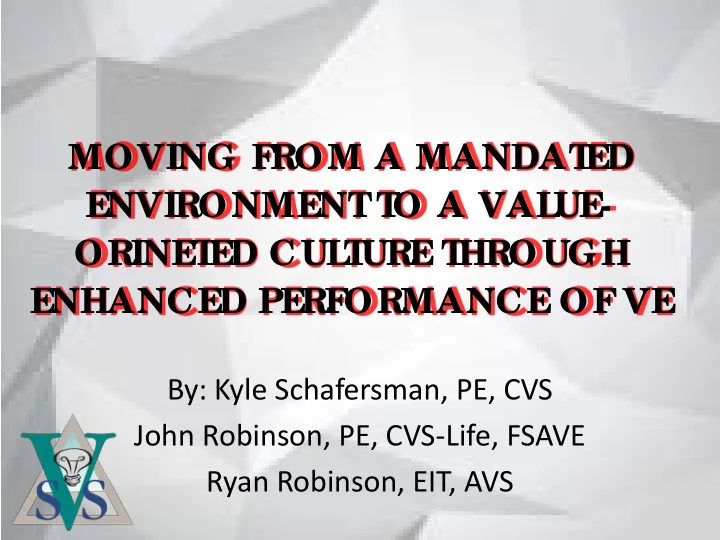

MOVING F ROM A MANDAT E D E NVIRONME NT T O A VAL UE - ORINE T E D CUL T URE T HROUGH E NHANCE D PE RF ORMANCE OF VE By: Kyle Schafersman, PE, CVS John Robinson, PE, CVS-Life, FSAVE Ryan Robinson, EIT, AVS
USACE Special Initiative Workshop “What is the function of VE?” Jeffery Hooghouse, AIA, DBIA, CVS – USACE Chief Value Officer Benjamin Robertson, PE, CVS – USACE Louisville VEO Kyle Schafersman, PE, CVS – SVS John Robinson, PE, CVS-Life, FSAVE – SVS Ryan Robinson, EIT, AVS – SVS
Mandate Environment = Negative
Why do we have to do value engineering?
PM, Managers, and Designers • Why is VE required when the planning and design process already: – Generates alternatives – Meet stakeholder needs – Within available budget – Multiple reviews throughout design • Isn’t intent of VE already being accomplished?
Several Questions to Contemplate • What makes VE uniquely different from other planning, design, and technical review process? • What distinguishes VE from other problem solving techniques • What has to be done for “IT” to be considered VE? • How does someone substantiate “IT” was accomplished properly?
What makes VE uniquely different from other planning, design, and technical review process?
According to SAVE & ASTM E1699-14 • Specific 6-step job plan • In a workshop format • Multidisciplinary team • Lead by qualified team leader (i.e. CVS)
FUNCTION ANALYSIS & FAST DIAGRAMMING
Expanding Solution-Set Or iginal De sign Solution- Se t CONSTRAINTS Solution- Se t E xpande d by VE Cr e ative Ide a Ide a De ve lope d into VE Alte r native DESIGN CRITERIA
What distinguishes VE from other problem solving techniques?
Total Quality Management (TQM) • Adopted in late 1980’s to early 1990’s • Stakeholders referred to as “customers” • Customer is king – Request are irrevocable – Give them what they want
Assumptions become constraints, often self-imposed
MYTH: Consultants are hired to provide the best solution • Pressure on fee & schedule (proceed with first solution that meets criteria) • Biased toward past experience • Give customer what they want
VE Challenges Everything • No other consistent review approach challenges like VE • Most reviews search for: – Technical errors – Verify compliance – Minor tweaks and adjustments
What has to be done and/or accomplished for “IT” to be considered VE?
6-step Job Plan In Workshop Format = Multidisciplinary Team Qualified Facilitator
Value Outc o me Sc o pe / PM Dur atio n/ Attitude E xpe r tise Budge t
Expectations for VE - Team • Team is appropriately sized and configured – Multiple disciplines and Subject Matter Experts – Disciplines necessary for all key aspects – Level of experience equal to or greater than design team
Expectations for VE - Information • Design Team is present – What is design doing – Why it was configured as proposed (rationale) • Key assumptions and constraints – VE Team questions or challenges design
Expectations for VE - Function • Appropriate amount of time • Identified functions create greater clarity • Generated functions stimulate creativity • Unique and meaningful
Expectations for VE - Creativity • Unconstrained brainstorming • Brainstorm on functions • Bring new ideas & solutions to design team • Challenge assumptions, constraints, decisions, and status quo
Expectations for VE - Evaluation • Encourage consensus without being unduly influenced by strong personalities • Bring new ideas & solutions to Design Team (at least some) • Strive to challenge assumptions, constraints, decisions, and status quo (at least some)
Expectations for VE - Development • Adequately documents to allow decision making • Explain context/rationale, why it’s a good idea • Clearly narrate proposed change • Comparative analysis with original • Sketches, calculations, cost impact (1 st & LCC)
Expectations for VE - Presentation • Engage expertise of the team • Communicate succinctly and effectively • Professional, courteous, and respectful • Avoid debating merits of alternatives (audience has not reviewed VE team’s work)
How does someone substantiate “VE” was accomplished properly?
“If yo u c an’t me asur e it, yo u c an’t manage it” Pe te r Dr uc ke r
Substantiate VE • Criteria/grading scale not included in paper • Functions that must be accomplished: – Understand Objectives – Expand Solution-Set – Supplement Knowledge-Base
Substantiate – Understand Objectives • Extract knowledge & analyze functions: – Was project-specific knowledge shared from Design Team? – Did function analysis communicate clear understanding of project? – Did functions stimulate creative thinking? – Do functions describe what project must do, not how it is doing it?
Substantiate – Expand Solution-Set • Did VE contest project criteria? • Were constraints examined and deemed valid? • Did VE challenge status quo? • Were assumption tested and validated? • Have design decisions been challenged? • Did VE endorse the solution being studied?
Substantiate – Supplement Knowledge-Base • Infuse expertise & expand knowledge: – Did VE represent independent thinking from design team? – Was team comprised of experts not just practitioners? – Did VE team composition broaden base of knowledge? – Did VE team bring new set of experiences? – Was team well versed in different types of solutions?
Conclusion • Mandated environment (negative perspective) – Caused by “check the box” mentality – Leads to poor performance – Results in least painless execution of VE (i.e. short, cheep, and sloppy) • Value-oriented culture (positive perspective) – Understand objectives, expand solution-set, supplement knowledgebase – Real and measurable accountability of VE – Industry needs to raise the bar on performance
T HANK YOU K yle Sc ha fe rsma n Stra te g ic Va lue So lutio ns, I nc . 19201 E . Va lle y Vie w Pa rkwa y, Suite H I nde pe nde nc e , MO 64055 816-795-0700 K yle @ SVS-inc .c o m www.svs-inc .c o m
Recommend
More recommend